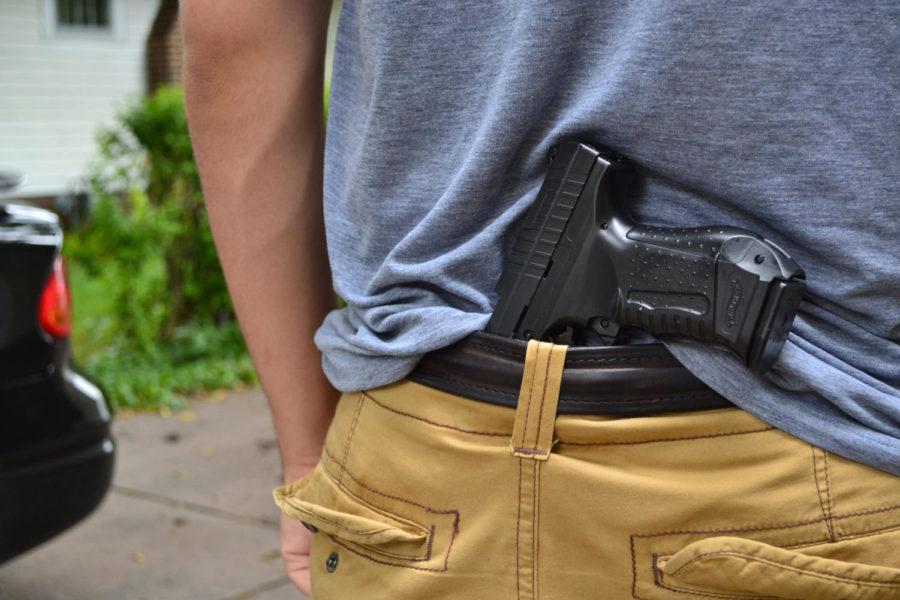Poll shows majority favors executive action
January 21, 2016
After President Obama’s speech on gun control, the conversation continues; should the executive branch take action?
CNN has posted polls conducted by telephone by ORC international in which 1,027 Americans were interviewed Jan. 5 and 6. The poll had a plus or minus of a 3 percent margin of error.
The poll found that 67 percent favor the executive orders Obama took to require background checks online and at gun shows, as well as making it easier for the FBI to complete background checks.
“We regulate all other important aspects of life,” said Max McDaniel, junior in history and president of the ISU Hunting Club. “Why wouldn’t we do the same for firearms?”
The poll also found that 54 percent oppose Obama using executive order to implement his policies.
“I do not think it’s right to take executive action,” said Brittany Gaura, president of ISU College Republicans “That’s not really how our country was set up for all these executive actions to happen.”
The American Presidency Project shows Obama has taken 227 executive orders, George W. Busch took 291 and Bill Clinton took 364. Franklin Roosevelt took the most executive orders with 3,721.
Gaura said she would have liked to have seen president Obama meet with Speaker of the House Paul Ryan and ask what can be done in terms of gun control.
Mack Shelley, university professor of political science, points out that extremely unfortunate decisions have been made in the past by presidents through executive order, citing the time during WWII when president Franklin Roosevelt took executive order to set up concentration camps for Japanese-Americans because he feared they may be loyal to Japan.
As for Shelley’s opinion on Obama’s most recent executive order, he said it was the only option Obama had.
“It’s not for a lack of trying,” Shelley said. “Right after Newtown there was a serious lobbying effort by the administration.”
Many Republican presidential candidates have recently said the president’s executive order is unconstitutional.
“Executive orders aren’t against the Constitution in any way,” Shelley said.
Shelley said Obama is simply reinforcing and doing a better job of enforcing existing legislation through these executive actions.
The president’s orders could most likely be overturned by the Supreme Court, but Congress couldn’t directly overturn the orders. Congress does litigate the government’s budget, which could overturn an executive order, Shelley said.
“Closing those trade show loopholes and making it more difficult for guns to get into the hands of irresponsible gun users, I think that’s common sense legislation,” McDaniel said.
Gaura said she isn’t completely against gun control, but she doesn’t want it to be any more difficult for law abiding citizens to own guns.
“A felon should not be able to go to a gun show and buy a weapon,” Gaura said.
Shelley said it would be easier and more efficient to have federal laws across the board than allowing each state to regulate firearms themselves, but it would depend on what one could get through Congress.
“It’s hard to think of a more important issue right now, or one that is more divisive,” Shelley said.
Every state as of now regulates how its residents go about purchasing and handling firearms, allowing states to be as strict or lenient as they want.
“In Texas, if you have a gun permit that you can produce, that’s enough for voter registration,” Shelley said.
But a student ID will not work for voter registration in Texas, Shelley said.
After the shooting in Newtown, Conn., in which 26 people, including 20 children, were killed in 2013, the Connecticut state legislature made major reform to its state gun laws.
The assault weapons ban and restrictions against domestic abusers were strengthened, and large capacity ammunition magazines were banned. Connecticut buyers also must have a permit to purchase any type of firearm.
Connecticut residents are also required to report any missing or stolen firearms to local police within 72 hours, or face a fine of $90,000 for a first offense and a class D felony for any consecutive offense.
Louisiana, which lies on the opposite end of the spectrum, is known to have some of the most lenient gun laws even after the movie theater shooting in Lafayette this past summer.
Louisiana does not allow local government to regulate firearms and recognizes open carry. The only permit required is to purchase a handgun.
Iowa is a “shall issue” state, which means law enforcement must issue a concealed weapons permit to an Iowa resident who has applied as long as he or she meets all of the criteria.
“It takes very little effort to get a concealed to carry permit,” Shelley said.
McDaniel said easy access to receiving a concealed to carry permit is concerning, especially with the option of online training.
“If you have the access and the ability to go purchase a high powered weapon you should have sufficient training,” McDaniel said.
The National Journal released a chart in August 2015 that showed states with stricter gun laws witnessed fewer gun-related deaths.
Republicans argue mental health should be reformed first because of the majority of gun-related deaths being suicides.
“People need to stop looking at what is causing these crimes as the issue and be looking at the person themselves,” Gaura said. “Mental illness is something we should look at when someone is purchasing a weapon”
















